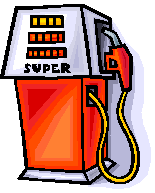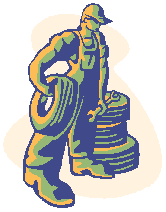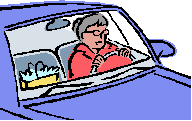|
Have you been getting dizzy watching the numbers roll by on the gas-pump display? Are you
 considering a second mortgage to finance your driving habit? Maybe not, but there's no denying that gas prices are pinching our pocketbooks.
considering a second mortgage to finance your driving habit? Maybe not, but there's no denying that gas prices are pinching our pocketbooks.
Combining trips is one way to reduce gas costs, but there are some additional tips related to car maintenance and behind-the-wheel habits that can also help you save gas and money. They come to us in the article below, which is adapted from the Union of Concerned Scientists' Greentips monthly newsletter, a very nice, user-friendly service.
~ ~ ~
Save at the Pump—and Help the Planet
by The Union of Concerned Scientists
With the cost of gasoline hovering near all-time highs, many consumers are becoming more conscious of their vehicle's fuel economy. Fuel-efficient vehicles save money, lower heat-trapping and smog-forming emissions, and reduce our dependence on oil imports.
Here are some ways to help your current car go farther on a gallon of gas.
BEAT HIGH GAS PRICES THROUGH VEHICLE MAINTENANCE
Engine Maintenance — Change your oil, spark plugs, and air filter regularly. And go to a repair shop if your "Check Engine" light comes on—a faulty oxygen sensor could be the cause, lowering your mileage significantly.
Tires — Keep your tires properly inflated and consider replacing worn tires with low-rolling-resistance (LRR) tires. LRR
 tires roll more easily on the road, reducing the amount of energy needed to move the car forward. Green Seal provides a list of LRR tire manufacturers (opens as PDF).
tires roll more easily on the road, reducing the amount of energy needed to move the car forward. Green Seal provides a list of LRR tire manufacturers (opens as PDF).
Engine Oil — Use the grade of motor oil recommended by your vehicle's manufacturer. Motor oil that bears the American Petroleum Institute's "Energy Conserving" performance label contains friction-reducing additives that save gas by letting your engine work more easily.
BEAT HIGH GAS PRICES THROUGH EFFICIENT DRIVING
Avoid Idling — If you have to sit in your car for more than one minute, shut off the engine. In cold weather, let the car warm up for no more than 30 seconds then drive gently until the engine is warm.
Drive Smoothly — Slow, even acceleration and braking can improve gas mileage. Avoiding those quick, heavy-footed starts from stop lights and stop signs will really rack up your fuel savings. And if you can anticipate the need to slow down for stalled traffic, traffic signals, and other reasons—and start slowing down earlier rather than later—you'll save even more gas.
Reduce Your Speed — Driving at the posted highway speed limit saves fuel because a car's engine usually works less efficiently at higher highway speeds.
Use Overdrive — If your vehicle's transmission has overdrive, use it once you reach the speed recommended in your owner's manual. This will lower engine speed and reduce fuel consumption.
Maintain a Consistent Speed — Using cruise control on the freeway will let you maintain your speed and maximize your highway-driving efficiency.
Limit Air Conditioning — Your car's engine must drive the air-conditioning
 compressor when the A/C is on, which causes the engine to work harder and consume more fuel. On the other hand, having the windows open at high speed creates drag on the vehicle, and that also reduces mileage. Your best mileage will come from having the windows rolled up and using just the car's fan (with the A/C off). Open windows at lower speeds are not as much of a drag problem.
compressor when the A/C is on, which causes the engine to work harder and consume more fuel. On the other hand, having the windows open at high speed creates drag on the vehicle, and that also reduces mileage. Your best mileage will come from having the windows rolled up and using just the car's fan (with the A/C off). Open windows at lower speeds are not as much of a drag problem.
Park in the Shade — This minimizes fuel evaporation while the car sits. In summer months, the shade will help keep your car cool, which means you'll have less need for the A/C once you're back on the road.
Be Weight Conscious — Whenever possible, stow items in the trunk or cargo area instead of on a roof rack, which creates drag. And don't carry around items you don't need; for every 100 pounds of extra weight in your car, fuel economy decreases by 1-2 percent.
Track Gas Mileage — Keep track of your average mileage and have your car checked if the average decreases. To calculate your mileage, divide the number of miles traveled since your last fill-up by the number of gallons of gas you just purchased to fill up. An easy way to keep track of how many miles you've driven since the last time you got gas is to reset the trip meter to 0 after each fill-up. Alternately, you can note the odometer reading and number of gallons purchased each time you fill up and do the math.
Additional Resources:
| The Union of Concerned Scientists is the leading science-based nonprofit working for a healthy environment and a safer world. An alliance of more than 250,000 citizens and scientists, UCS combines independent scientific research and citizen action to develop innovative, practical solutions and to secure responsible changes in government policy, corporate practices, and consumer choices. Visit them at www.ucsusa.org. |
|
~ ~ ~
OK, that tip about reducing unnecessary weight is NOT a reason to ditch your mother-in-law on the family trip.
Here's one final tip: RELAX! A tense, competitive commuter is more likely to engage in fuel-wasting fast starts, quick stops and zippy lane changes. It's not easy, but if you can figure out a way to see your driving time as a chance to relax and, say, listen to a book on tape, then you'll save gas, enjoy your time behind the wheel more, and be healthier too. Stress is a killer, man!
More articles and resources:
Get Grinning Planet free via email
|


